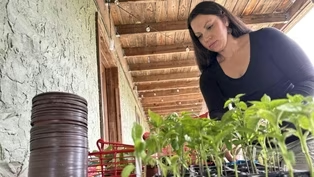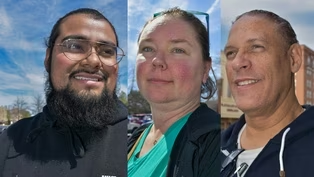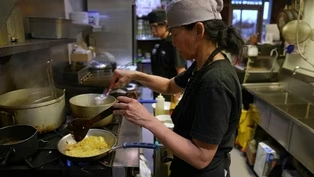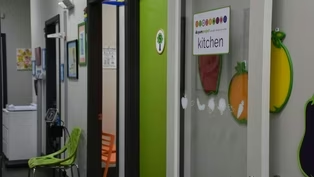VPM News Focal Point
Activists say Marcus Alert System isn’t doing enough
Clip: Season 2 Episode 5 | 5m 8sVideo has Closed Captions
Advocates say the Marcus Alert System isn't protecting people with mental health issues.
After the death of Irvo Otieno at Central State Hospital. The sister of man shot and killed by Richmond police while he was experiencing a mental health crisis says the Marcus Alert System isn’t doing enough to protect Virginians struggling with mental health challenges.
Problems playing video? | Closed Captioning Feedback
Problems playing video? | Closed Captioning Feedback
VPM News Focal Point is a local public television program presented by VPM
The Estate of Mrs. Ann Lee Saunders Brown
VPM News Focal Point
Activists say Marcus Alert System isn’t doing enough
Clip: Season 2 Episode 5 | 5m 8sVideo has Closed Captions
After the death of Irvo Otieno at Central State Hospital. The sister of man shot and killed by Richmond police while he was experiencing a mental health crisis says the Marcus Alert System isn’t doing enough to protect Virginians struggling with mental health challenges.
Problems playing video? | Closed Captioning Feedback
How to Watch VPM News Focal Point
VPM News Focal Point is available to stream on pbs.org and the free PBS App, available on iPhone, Apple TV, Android TV, Android smartphones, Amazon Fire TV, Amazon Fire Tablet, Roku, Samsung Smart TV, and Vizio.
Providing Support for PBS.org
Learn Moreabout PBS online sponsorshipADRIENNE McGIBBON: After the death of 28-year-old Irvo Otieno while in police custody at Virginia Central State Hospital, there's tremendous frustration among advocates pushing for changes in how police respond to mental healthcare calls.
PRINCESS BLANDING: I've been very outspoken about the failures of the Marcus Alert System, named after my brother Marcus-David Peters, and this is a prime example.
ADRIENNE McGIBBON: Virginia passed the Marcus-David Peters act in 2020.
It was named for Marcus-David Peters, who was 24 and experiencing a mental health crisis when he was shot by a Richmond police officer.
Princess Blanding, whose Peters' sister and an activist who ran for Virginia Governor in 2021, worked with legislators to craft the law PRINCESS BLANDING: After Marcus was murdered, we said, we can't bring him back.
But what we can do is craft legislation to ensure that having a mental health crisis does not result in excessive use of force, right, unjust incarceration, and in too many cases, murder.
And it fell on our doorsteps here in Virginia not far from Richmond yet again.
ADRIENNE McGIBBON: The legislation created the Marcus Alert System to provide help for people experiencing a mental health crisis.
It calls for providing a behavioral health response to behavioral health emergencies.
Blanding points out that Otieno was inside a psychiatric hospital when he was killed.
She says mental health professionals need specific training to handle aggression.
PRINCESS BLANDING: What's sad and unfortunate is that he was in a place where he was supposed to get care, right?
Where there were people who were supposed to be trained to deal with people who are aggressive.
If you're not in your right frame of mind, you don't care that a police officer is present, you know?
And it resulted in him being murdered.
ADRIENNE McGIBBON: The Marcus Alert System is in the early stages of implementation.
Five pilot programs went into effect last year, including one in Richmond PRINCESS BLANDING: Because we said, let's get people out, these mental health professionals and peer recovery specialists that have that lived experience.
Let's get them in the community.
Let's start to break down the stigma surrounding mental health, especially in the Black communities, where we oftentimes don't feel comfortable asking for help.
ADRIENNE McGIBBON: The Richmond Police Department is partnering with the Richmond Behavioral Health Authority to establish protocols for responding to mental health crises.
The CEO of Richmond Behavioral Health says they've been providing many of these services for years but the law has made some positive changes.
JOHN LINDSTORM: It's not like nothing existed before, right?
So Marcus Alert brings some new strategies and some new requirements to the process.
ADRIENNE McGIBBON: Lindstrom points to Crisis Intervention Training, or CIT, as one benefit of the Marcus Alert.
JOHN LINDSTORM: I mean, it is an effective practice and it's good because the vast majority of interactions with individuals with mental health issues initiate with police.
But what Marcus Alert does is it sets up the expectation that we have more formalized communication protocols between emergency communications, or 911, and the rest of the behavioral health system.
ADRIENNE McGIBBON: Richmond has two community response teams that are trained to respond to mental health crises JOHN LINDSTORM: That consists of a behavioral health clinician and a trained law enforcement officer.
And they've cross-trained, so they know some police culture and operational issues.
And they, you know, vice versa.
It's designed to provide some assurance to the community that we're working on this, that we heard the concerns about fearing calling, not sure what they're going to get.
And we're asking them to work with us in developing out the system so that there's going to be times, and they'll understand there's going to be times, where the circumstances warrant police.
ADRIENNE McGIBBON: In the case of Irvo Otieno's death, Lindstrom says he isn't familiar with the specifics, but warns, JOHN LINDSTORM: There's nothing in any plan that provides the absolute assurance that under certain circumstances something might not happen that none of us would want to see happen.
ADRIENNE McGIBBON: Despite mistrust, Lindstrom encourages people dealing with mental health challenges to reach out for help.
JOHN LINDSTORM: I know that some people just don't want to call because they fear what will happen.
I think that there's much less possibility that their fears would be realized.
I cannot assure that there's no chance.
ADRIENNE McGIBBON: Although Princess Blanding is critical of the slow rollout of the Marcus Alert system, she does acknowledge that it's made some positive differences.
PRINCESS BLANDING: I am thankful that there is something.
I have a close community member who's like a family member to me tell me that she had to call for someone else and she was very thankful that that individual that was dealing with a crisis was handled with love and care.
But we need that to be consistent.
Connecting with ancient traditions through seeds
Video has Closed Captions
Clip: S2 Ep5 | 7m 59s | Native Americans ensure the survival of heirloom seeds that connect them with the past. (7m 59s)
Video has Closed Captions
Clip: S2 Ep5 | 3m | Lynnhaven oysters are known for their size and saltiness. (3m)
People of Virginia | Food and Culture
Video has Closed Captions
Clip: S2 Ep5 | 1m | We talked with people of Virginia about food, we found most have an emotional response. (1m)
Soul food is closely tied to Black cultural identity
Video has Closed Captions
Clip: S2 Ep5 | 8m 21s | Byron Hurt explores Soul Food and its complicated connections to the Black community. (8m 21s)
Taste of Home: Immigrant-owned restaurants in Harrisonburg
Video has Closed Captions
Clip: S2 Ep5 | 4m 14s | Harrisonburg restaurant owners from Kurdistan, Mexico and Malaysia share their stories. (4m 14s)
This doctor says food is, indeed, medicine
Video has Closed Captions
Clip: S2 Ep5 | 1m 39s | For centuries, there have been cultures that treat diet as medicinal. (1m 39s)
Providing Support for PBS.org
Learn Moreabout PBS online sponsorship
- News and Public Affairs

Top journalists deliver compelling original analysis of the hour's headlines.

- News and Public Affairs

FRONTLINE is investigative journalism that questions, explains and changes our world.












Support for PBS provided by:
VPM News Focal Point is a local public television program presented by VPM
The Estate of Mrs. Ann Lee Saunders Brown





